Are you planning to start a blog in 2023? If you have knowledge of some topics or niches you can start a blog even in now. At the same time, it is very easy to start a blog current days. Unlike in the previous days, you do not need programming knowledge to start your blog.
If you have certain topics on your mind that you think many people are searching for online, then you can easily start your own blog which the people searching online will easily find on Google search. To start a blog you will only need a topic, a domain with a hosting server, and a blogging platform like WordPress or Blogger.
In this article, you will learn exactly how to start a blog that makes money. This guide is so comprehensive that you will learn everything you need to know on how to start a blog now. This includes: learning how to get a domain and hosting, installing WordPress, the initial setup required after installation, the best WordPress themes for blogs and must-have plugins for blogging sites, and finally the best way to write SEO-optimized blogs.
Table of Contents
What is a Blog?
Before starting a blog, do you know what exactly is a blog? If you are searching for how to start a blog, you must know what is a blog and what it should look like. But if you are not sure what exactly is a blog then I will give you a practical definition of a blog and how it differs from a website.
Blogging is a form of online publishing that allows individuals to share their thoughts and opinions with the world. A blog is a website that contains articles, typically written by one or more authors, each of which is usually accompanied by comments from readers. A Blog is typically run by an individual or small group of individuals who are known as bloggers.
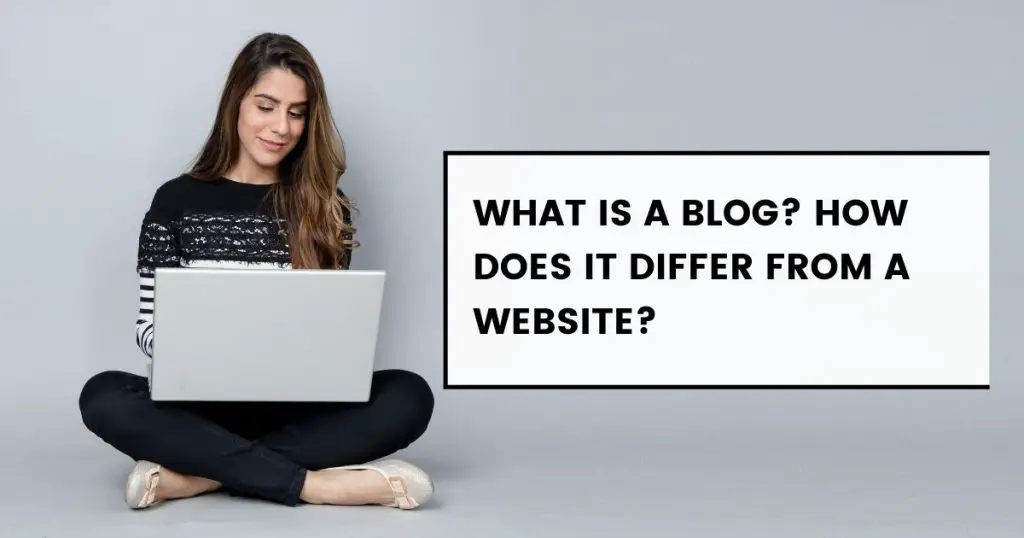
A blog generally covers multiple topics, which should be designed in such a way that, the readers are able to identify exactly what they want to read. The standard identity of a blog is that the most recently published posts should appear just below the header and navigation or at least on the landing page.
Now, let me clarify to you the differences between a blog and a website. A website is a dynamic or static page where you will see very few numbers in timely changes. Websites are generally created to represent any business, product, or service. For example, when you visit a web-hosting site such as Hostinger, on the landing page, you will see the list of offered managed WordPress hosting plans.
The landing page remains almost unchanged except when they introduce new plans or seasonal offers. A blog must have a motive of providing detailed information on a certain topic or on multiple topics. But this does not entirely means that a website and a blog are completely different. A blog can be a part of a website but websites are not part of a blog.
To illustrate this let’s take an example of the website of Managed WordPress Hosting Provider Kinsta. Kinst on the landing page contains a static webpage which is no doubt a Business Website. But, have you ever noticed that it has already published around 900 blogs? You can look at the following sitemap of Kinsta’s Blog which contains 899 URLs.
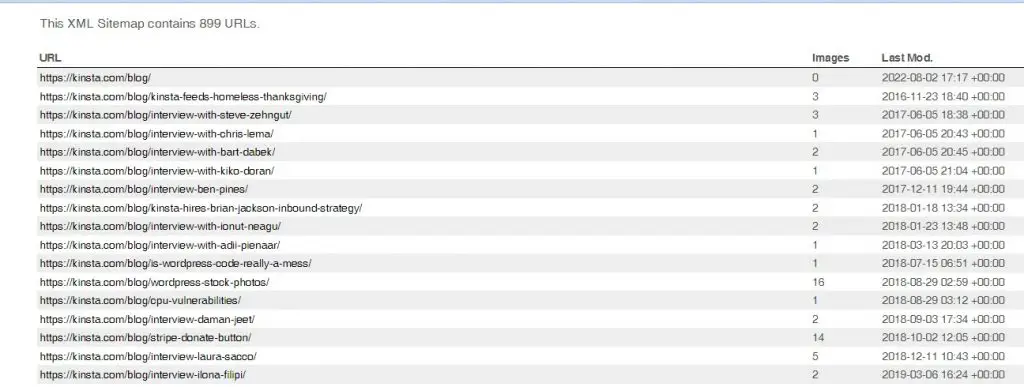
I hope you got the idea behind a website and a blog. So, if you are making a site that resembles with above-mentioned features this is called a Blog. And the entire process of making a site and publishing your content is known as blogging.
Therefore, in general, we can state blogging as a way to build your blog and start sharing your knowledge on particular topics. In practice what you are reading is a blog and what homework I did before publishing this blog and what I do for the betterment after publishing it is Blogging.
When Should You Start a Blog?
Well, there are no exact conditions and time frame to start a Blog. You can start a blog at any time and age you like. The most important condition is you must have a good level or expert-level knowledge of the niche you want to write about. Moreover, the availability of enough time is also another important factor to be considered in order to start a blog.
At last what I can say is if you have a decent level of knowledge on certain topics and time for writing on them, you can start a Blog at any age or condition.
How Much Does It Cost To Start A Blog?
The cost of making a blog depends upon various factors. Each decision might affect this process. You can even start it for free. To know how to start a blog with no money please stick till the end and you will also get a few free methods in each step.
But in general, it costs a little bit of money to start a blog. The following are the estimated cost of different components for starting a blog.
| Particulars | Costs | Remarks |
|---|---|---|
| Domain | $0-$12 per year | It will be free if you purchase hosting from my affiliate link: Bluehost Namecheap Hostinger |
| Hosting | $0-$100 per year | Hosting is free in Blogger and Infinityfree, and you can avail of some discount if you purchase it from: Bluehost Hostinger Namecheap |
| Content Management System (CMS) | Free | Most content management systems are free. Especially the best platforms WordPress and Blogger are free. |
| Themes and Plugins | Free | You can find thousands of themes free in the WordPress repository. If you want premium themes and plugins you can buy them from Envato Market or Envato Elements. |
| Total | $5 and above | You must spend at least 5 dollars on the domain if you are not getting hosting. |
Learn: How you can start a blog in Nepal even for free.
Why Start a Blog?
The purpose for starting a Blog may vary from person to person. Some may want to earn from it and some may learn from it. I will list the common purpose someone wants to start a Blog below. Identify yourself among them and follow relevant instructions.

- Earn Passive Income
- Brand Blogging (Personal/Impersonal Branding)
- Learn or Enhance Knowledge
- Utilize The Free Time
1. Earn Passive Income
The majority of people want to start a blog to earn passive income. This goal can be achieved by publishing blogs and showing advertisements or selling affiliates’ products or selling their own products to the traffic driven.
People with the motive of only generating passive income from a blog generally prefer to write on multiple niches. These kinds of Blogs generally provide surface knowledge and are more often targeted at viral and trending topics only.
2. Brand Blogging For Business Promotion
If the primary motive of starting a Blog is for the Branding of the blog name followed by passive income generation, this is called Brand Blogging. If you have advanced or expert level Knowledge on something, this might help you to establish a Branded Blog.
To be more specific, let me take Mr. X, who writes Blogs on his childhood memories, current status, travel blog, etc. Suppose, he decides to write a blog on how he migrated his Blogger Blog to WordPress and even ranks first on google. When visitors like me read that blog and find no more content related to that topic won’t try remembering it for future use.
But if the same thing is read at WPbeginner or Kinsta, he might even bookmark it. Because they are having classified and branded content on their Blogs. So, Blogs with a capacity for visitor attraction will be remembered and consequently turns into an identifiable brand.
3. Start a Blog for Learning and Self-Enhancement
These kinds of Blogs are started by those who have no intention of earning from Blogging. Because earning from a blog is not going to fulfill their need to buy a $21,000 music system for their $5 million Lamborghini.
This means, that those who are rich enough with their identity may still want to start a blog to share their experiences and improve themselves. There is almost no chance that you fall into this category. And, of course, not statistically, but more than 90% may fall under the 1st and 2nd categories.
4. Utilization of Free Time
If you want to start a Blog just to utilize your time and share experiences with global audiences, you can start a Blog right now. And, you should not be worrying about any costs and setup because, your kind of needs can be fulfilled by free Blogging platforms like Blogger, Tumblr, medium, etc.
If you seriously want to start a passive income-generating blog or branded blog, the following step-by-step guide may help you. The following blog will also help those who want to start a blog as a passion or for self-actualization blogging. But, for non-serious bloggers, it may not be helpful.
Steps to Start A Blog
(Starting the Comprehensive Guide)
After all these outlines, let’s start the actual procedures that explain how to start a successful blog and make money online. You will learn how to start a blog from scratch if you follow each step explained below.
Select Your Niche or Topic of Your Blog
Niche is the specific category of your blog on which your blog content is targeted. Selecting a niche is a prime task, as having a blog is not difficult but maintaining continuity on the same topic is very critical. Therefore, the niche of the blog should be more of your interest or passion, which could be anything. Do you have knowledge of any special topic? If you have any special skills, then you may express them via words.
If you think, you have partial knowledge of something then try learning more and start a blog. But if you have a broad knowledge of different subjects or topics then do proper research on which sector the demand (search volume) for your blog is high. It means you have to think about the topic on which you can give your best and enough time. Also, it is equally important that a decent number of people search the blog you are going to write.
Similarly, Visit Everest Nepal has focused on the Tourism niche. You can visit this page, Sukute Beach in which the author has explained how is Sukute Beach and the services and facilities available at Sukute Beach with the Packages Cost.
To have a better understanding of it, you can also read my next article in which I have explained what is niche and how to choose the best niche to understand best about the niche selection.
Get the Perfect Domain for Your Niche
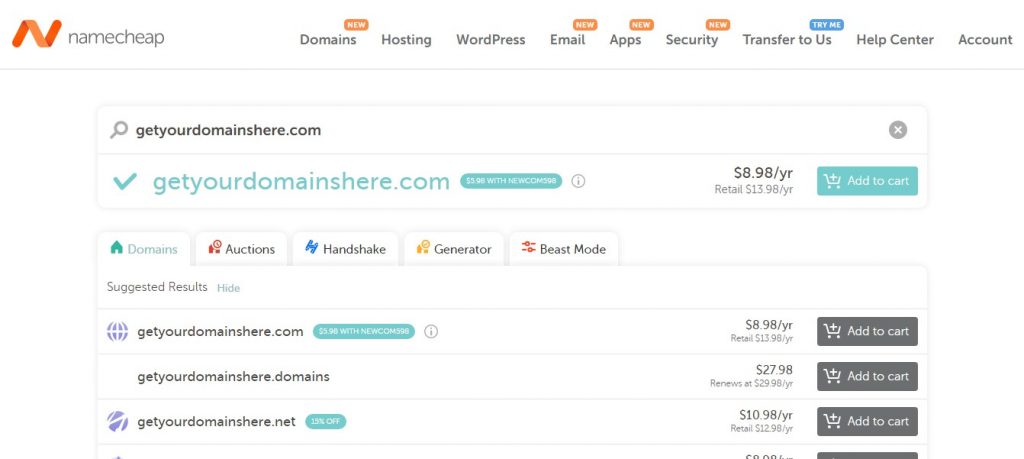
As you are searching for how to start a blog, I can assume that you know at least about the domain. The domain is simply an address through which someone can access to any site. The site you are currently reading this blog is also accessed from a domain.
Therefore, the next step to starting a Blog is to buy a domain. Generally, a domain name is preferred to match the niche you are planning to start a blog. But, it will not necessary that it will be able to optimize your site for search engine results.
For example, searchenginejournal.com writes blogs on how to optimize a site for search engines. The domain name and the niche is matching for this domain. Whereas, Neilpatel.com, a name-based domain also writes blogs on search engine optimization, and most of the time it beats others in terms of SEO.
Therefore domain names can be any. But keep in mind that, the domain names should be clean, short as possible, and easy to memorize. The other part of a domain is its extension part. So, what extension do you prefer? There are different extensions available as a top-level domain.
Mostly, the .com domain is preferred because the leading websites in the world have a .com extension and which made people more partial toward the .com domain. And for the same reason, I also prefer a .com as an extension and advise you to buy a .com domain. Therefore, buy a domain that resembles your niche or any brand you want to make with your blog with a .com extension (preferably).
If you select a niche that is more focused on country-specific topics and language, you can also go for a country-code top-level domain. Buying a .com domain will cost you from $8-$11 depending upon the registrar. If you are going to start a Blog on WordPress, you may buy a domain and host together at an even cheaper rate. If you are Nepali, you can also get a ccTLD .com.np domain for free.
If you want to start your blog for free on Blogger, then you may also consider using the blogspot.com subdomain. But it will not be perfect as you won’t get the perfect name and won’t own the domain. Therefore, for serious blogging, I suggest you get a domain that can be purchased from Name.com or Namecheap or Domain.com, Bluehost, etc
Selection of Platform
To start a blog you will need a content management system using which you will design your blog, publish, edit, and update the blog posts, and many more. The most popular platforms for blogging are WordPress and Blogger.

For a beginner, it may be hard to decide which platform to choose for the investment of money and time. In my opinion, you should consider Blogger only if you do not have the investment to get hosting. Blogger is a free platform offered by Google that comes with free hosting. But the Blogger’s free hosting is not flexible and file access is not given as a result you will not have the flexibility to customize the platform much.
And ultimately, you have to go for WordPress as it provides more flexibility on how and what you want to do with your blog. So, in short, you have to go for WordPress for Blogging as and when you have a few dollars to buy hosting.
If you do not like to go with Blogger from the beginning, and still want the hosting free, you can also get free unlimited hosting from Infinityfree where you can start your blog and move to a paid plan after your site starts performing.
To learn more about which content management system is the best for you please read another blog, where I have made a detailed comparison between Blogger vs WordPress.
Get Hosting for Your Blog
Before buying a hosting package, you should understand what is web hosting and which hosting plan you should buy for a blog. Web hosting is file storage that stores different kinds of data and files such as images, texts, etc.
Simple hard drive storage does not work to host your website. The storage must be from the data center of big companies which are capable of making your site’s files accessible from any devices connected to the global internet.

The hosting service stores data and files and makes them available to visitors when accessed from that particular domain where it is connected through the DNS setting. If you have ever visited the websites of hosting service providers like Bluehost, Hostinger, Siteground, etc. you may have probably seen different hosting plans.
Hosting companies offer Shared, Virtual Private Server (VPS), Managed WordPress, eCommerce, Dedicated, etc. The price depends on the features and capacities of each class hosting plan.
To start a blog, a beginner can always go for a shared hosting plan. shared hosting can handle a starter blogging site easily. A blog hosted on a shared hosting plan can normally handle monthly traffic of 10,000-20,000. When you start getting high traffic or completely consume the storage, you may upgrade to a higher plan or migrate the site somewhere. So, as a beginner, I suggest you buy a shared hosting plan either from Hostinger or Bluehost.
Read More About Hosting:
Installing WordPress on Your cPanel
After buying a suitable hosting plan you will need to install WordPress or any content management system on your site. Here in this blog, I will be guiding you about WordPress CMS. It is easy to install WordPress on cPanel. You can go to Softaculous Installer provided in your cPanel and follow the instruction there to install it.
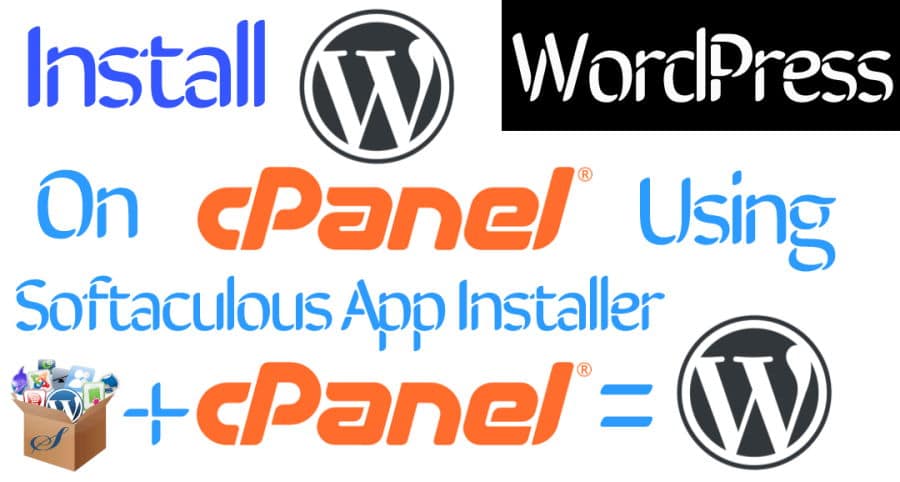
You can also read this blog and follow the steps to learn how you can install WordPress on cPanel. In case there is no auto-installer provided by the hosting service provider, you can also install WordPress manually.
Connection Your Domain With Blogger

As mentioned earlier, you can also use a blogger to start a blog. If you are seriously planning to start a blog on Blogger, then sign into Blogger with your Google account and start one with the BlogSpot subdomain right now. If you already own a BlogSpot site and wish to connect the custom domain, you can also do that. To connect a domain with a blogger, please follow the guide to connect a custom domain with Blogger.
The Must-Have Initial Setup Required After Installation of WordPress
Here is the must-have initial setup required after the installation of WordPress.
- Basic Initial Setup Required After Installation of WordPress
- Site Name and Tagline
- Discourage search engines From Indexing the Site
- Delete Sample Page and Post
- Deleting Unnecessary Plugins
- Deleting Unused Theme
- Make Permalink SEO Friendly
- Advance Initial Setup Required After Installation of WordPress
- Activate Akismet Antispam
- Installing Classic Editor
- Install JetPack
- Install SEO Plugin
- Install Backup Plugin
- Make Single / One URL (Redirect)
Customize Your Blog
After installing WordPress or connecting the domain with Blogger, you may get a site with a basic design to show the post and basic header. It is important to have an attractive design for the blog.
Therefore, you will need to customize the site immediately after you start a blog. The design of your site on Blogger is fully dependent on the template you use. The design of your WordPress blog is affected by the template as well as the templates. You can install the template from the appearance option of your WordPress site’s dashboard.
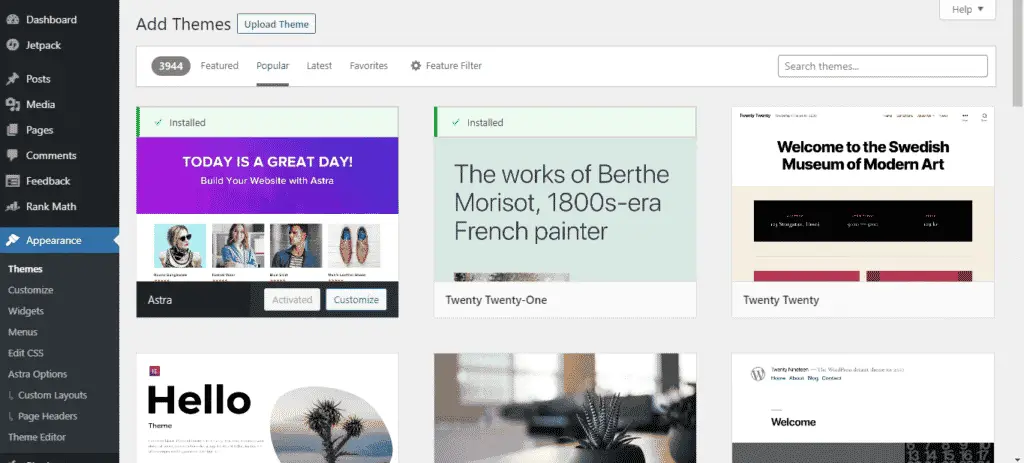
Best Templates to Start a Blog on WordPress
Initially, a default WordPress template gets installed on your blog, which is twentytwentyone which is the best and lightweight. But, it lacks in terms of customization. Therefore, here is a list of the really best templates with a lot of customization options available for free.
Astra
Astra is a lightweight and fast WordPress with the highest number of installations from third-party developers. You can use it for free and get lots of features for customization and the appearance of your site.
Blocksy
Blocksy is another customizable WordPress template. It is also lightweight but slightly heavier than Astra. You can use it for free and it offers more customization options than any other free templates in the WordPress depository provides.
GeneratePress
GeneratePress is another free template that is even lighter than Astra and customizable for any appearance. The reason for ranking it down is the footer credit. It doesn’t offer custom footer copyright notes. However, you can remove or replace the footer copyright note by editing the source code or using plugins.
OceanWP
OceanWP is like the ocean in terms of customization. But, it is more focused on eCommerce sites. However, you can use it to start a blog as well.
Read This:
Bogger Templates to Start a Blog
Blogger is exclusively for blogging sites. Therefore, you will only get some basic templates for it. However, there are some templates available for free and some can be purchased or downloaded for free from third-party sites.
Here is the list of some templates I personally found to be lightweight and SEO-friendly.
- MagOne
- Ultralite
- Freebify
- UltraMag
After installation setting up a blog and installing the required theme, you can modify its appearance as per your requirements. In both blogger and WordPress, you will find an option to customize your theme.
Conclusion
If you are really interested in starting a blog and have no idea how to set up everything, I am helping my readers to set up and run a blog on WordPress for free. You can check the Services section to avail this limited-time offer.
Discover more from Grisma Blog
Subscribe to get the latest posts sent to your email.